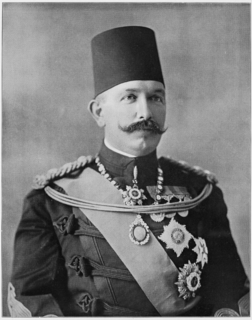
Abbas II Helmy Bey was the last Khedive of Egypt and Sudan, ruling from 8 January 1892 to 19 December 1914. In 1914, after the Ottoman Empire joined the Central Powers in World War I, the nationalist Khedive was removed by the British, then ruling Egypt, in favour of his more pro-British uncle, Hussein Kamel, marking the de jure end of Egypt's four-century era as a province of the Ottoman Empire, which had begun in 1517.
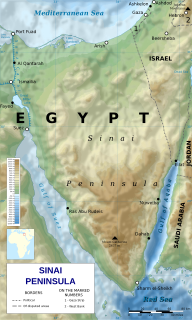
The Sinai Peninsula, or simply Sinai, is a peninsula in Egypt, and the only part of the country located in Asia. It is between the Mediterranean Sea to the north and the Red Sea to the south, and is a land bridge between Asia and Africa. Sinai has a land area of about 60,000 km2 (23,000 sq mi) and a population of approximately 600,000 people. Administratively, the vast majority of the area of the Sinai Peninsula is divided into two governorates: the South Sinai Governorate and the North Sinai Governorate. Three other governorates span the Suez Canal, crossing into African Egypt: Suez Governorate on the southern end of the Suez Canal, Ismailia Governorate in the center, and Port Said Governorate in the north.
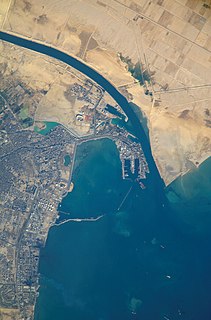
The Suez Canal is an artificial sea-level waterway in Egypt, connecting the Mediterranean Sea to the Red Sea through the Isthmus of Suez and dividing Africa and Asia. The canal is a route of trade between Europe and Asia.
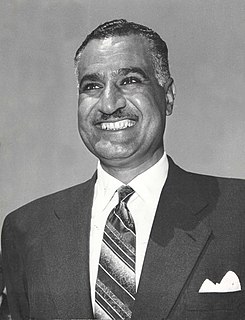
Gamal Abdel Nasser Hussein was an Egyptian politician who served as the second president of Egypt from 1954 until his death in 1970. Nasser led the 1952 overthrow of the monarchy and introduced far-reaching land reforms the following year. Following a 1954 attempt on his life by a Muslim Brotherhood member, he cracked down on the organization, put President Mohamed Naguib under house arrest and assumed executive office. He was formally elected president in June 1956.

Suez is a seaport city in north-eastern Egypt, located on the north coast of the Gulf of Suez, near the southern terminus of the Suez Canal, having the same boundaries as Suez Governorate. It has three harbours, Adabiya, Ain Sokhna and Port Tawfiq, and extensive port facilities. Together they form a metropolitan area, located mostly in Africa with a small portion in Asia.
In Arabic onomastics ("nisbah"), Al-Badawi denotes a relationship to or from Bedouin areas. It is both a given name and a surname. Notable people with the name include:
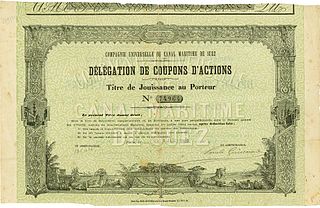
The Universal Company of the Maritime Canal of Suez was the concessionary company that constructed the Suez Canal between 1859 and 1869 and operated it until the Suez Crisis that had occurred in 1956. It was formed by Ferdinand de Lesseps in 1858, and it operated the canal for many years thereafter. Initially, French private investors were the majority of the shareholders, with Egypt also having a significant stake.
Ahmed Zaki Metwally Abdelrahman Badawi, usually known as Ahmed Zaki, was an Egyptian film actor. He was characterized by his talent, skill, and ability in impersonating. He was also famous for his on-screen intensity. Though he first appeared in a small role within a comedy play, he is widely regarded as one of the most talented male actors, especially in dramatic and tragedy roles. Zaki has 6 films in the Top 100 Egyptian films list.
Abdur Rahman Badawi was an Egyptian existentialist philosopher, professor of philosophy and poet. He has been called the "foremost master of Arab existentialism." He authored more than 150 works, amongst them 75 which were encyclopaedic. He wrote easily in his native Arabic, English, Spanish, French, German and Italian, and read Greek, Latin and Persian.

Suez Canal Authority (SCA) is a Egyptian state-owned authority which owns, operates and maintains the Suez Canal. It was set up by the Egyptian government to replace the Suez Canal Company in the 1950s which resulted in the Suez Crisis. After the UN intervened, the three invading countries were forced to withdraw.

Muhammad Salah Eldin Bahgat Ahmad Helmy, known as "Salah Jaheen" or "Salah Jahin" was a leading Egyptian poet, lyricist, playwright and cartoonist.
Mashhour Ahmed Mashhour (April 1, 1918 – July 6, 2008) was the Chairman of the Suez Canal Authority.

Ahmed Muhammad Helmy Abdel Rahman Awwad is an Egyptian actor, comedian, film producer, TV host and diplomat. He started his career in 1993 on the Egyptian satellite broadcast in a program called Leib Eyal. In 1998, he made his first movie Aboud Ala El Hedoud.

The history of Egypt under Gamal Abdel Nasser covers the period of Egyptian history from the Egyptian Revolution of 1952, of which Gamal Abdel Nasser was one of the two principal leaders, spanning Nasser's presidency of Egypt from 1956 to his death in 1970. Nasser's tenure as Egypt's leader heralded a new period of modernisation and socialist reform in Egypt, along with a staunch advocacy of pan-Arab nationalism, and developing world solidarity. His prestige in Egypt and throughout the Arab World soared in the wake of his nationalisation of the Suez Canal Company in 1956, and Egypt's political victory in the subsequent Tripartite Aggression, but was damaged badly by Israel's successful invasion and occupation of Egyptian, Palestinian, and Syrian territory in the Six-Day War of 1967.

Ahmed Badawi Sayyid Ahmed was an Egyptian Field Marshal (Mushir) and the Chief of the General Staff of the Armed Forces.
Hisham Nazer was the third oil minister of Saudi Arabia after Abdullah Tariki and Zaki Yamani which he was named on 24 December 1986. He was also the first Saudi board chairman of Aramco, which was later called Saudi Aramco. He was one of the significant people in developing the domestic policy of Saudi Arabia. He also served as Saudi ambassador to Egypt from 2005 to 2011.

Atef Helmy Nagib is an Egyptian communication and technology expert and the former minister of communications and information technology.
General Dr. Helmy Afify Abd El-Bar was a highly decorated Egyptian military commander.
The Third Field Army is a field army of the Egyptian Army, with its headquarters in Suez. It is now part of the Unified Command of the area east of the canal (Egypt).
Ahmed Shafiq Bahgat was an Egyptian writer and journalist, born in Cairo on the 15th of November 1932 and died on the 11th of December 2011. He had a bachelor's degree in law from Cairo University.











